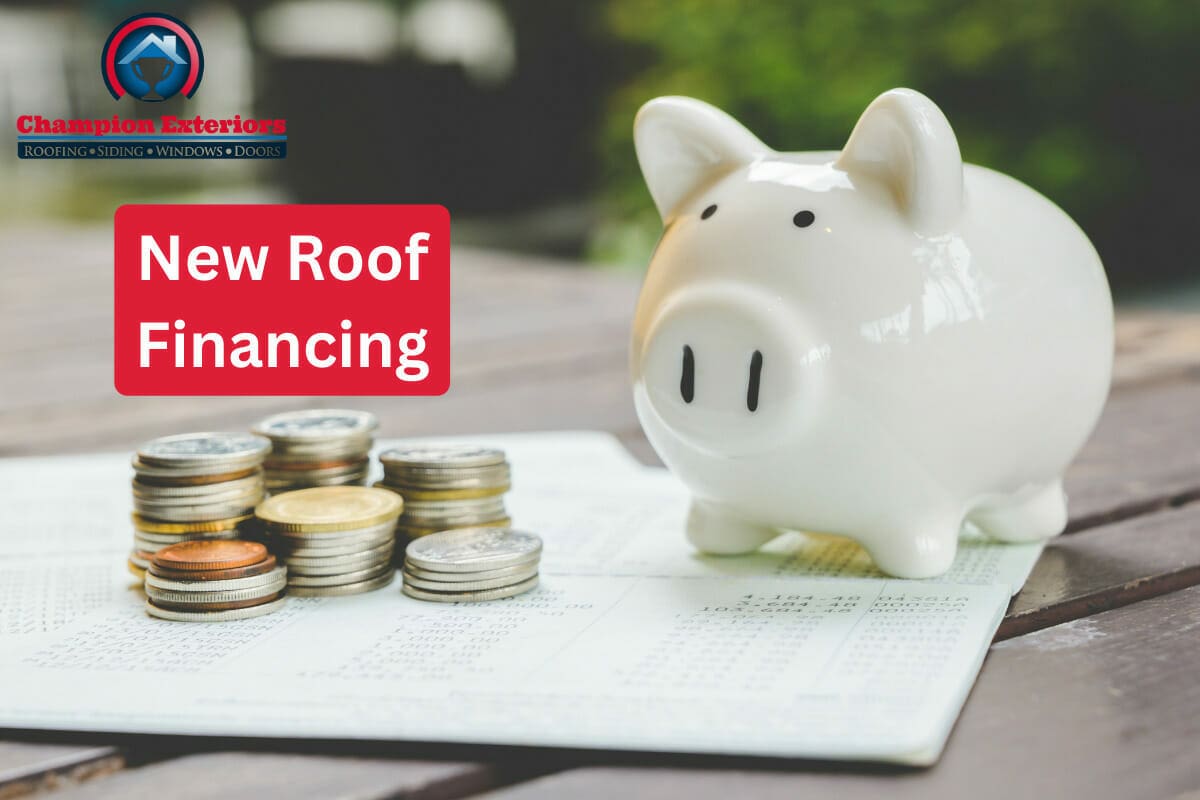Are you in need of a new roof installation or replacement but are worried about the cost? If so, you’re not alone. A new roof is a significant investment, and financing is often necessary to make it affordable. However, with so many financing options available, it can be challenging to know where to start.
In this blog post, we’ll answer seven of the most commonly asked questions about new roof financing to help you make an informed decision. Whether you’re a first-time homeowner or have been through the process before, this blog will provide valuable insight into how to finance your new roof. So, let’s dive in and get your roofing project underway!
What Is New Roof Financing?
New roof financing refers to financing options specifically designed for homeowners in need of a new roof. The financing options issued by financial institutions help property owners pay to replace their damaged or worn-out roofs with a new one. It involves borrowing money from a lender and repaying it with some added interest over a period of time.
Homeowners look for new roof financing options for many reasons, like in response to roof damage from heavy storms, or simply due to wear and tear over time. Since a new roof is a significant expense, many homeowners may not have enough money on hand to pay for a total roof replacement or a new roof installation, so financing options provide a way to pay for a new by helping out the property owners with a loan.
You can choose a financing option that suits you best from the many available, including personal, home equity, and home improvement loans. Personal loans typically have higher interest rates, while home equity loans are secured by the borrower’s home and offer lower interest rates.
Home improvement loans are specifically designed for home improvement projects and may have more flexible repayment terms.
What Are The Benefits Of New Roof Financing?
Financing a new roof can offer several benefits, including allowing homeowners to replace a damaged or worn-out roof without having to pay the full cost upfront. Additionally, financing can provide flexibility during the repayment period, allowing homeowners to spread out the cost of their roof over time, often with a fixed interest rate.
Financing Makes A New Roof More Affordable
Financing can make a new roof more affordable by providing access to additional funds that can be used to pay for the roof. This allows homeowners to install higher-quality roofs or choose more durable materials that may otherwise be out of budget. Additionally, financing may offer more flexible repayment terms than paying with cash, allowing homeowners to choose a repayment period that fits their budget and financial goals. Finally, financing may offer tax benefits or other incentives that make it a more attractive choice than paying with cash.
What Factors Should I Consider Before Financing A New Roof?
When considering financing options for a new roof the repayment terms of the financing, and the interest rates associated with the loan, are all critical factors that will impact the overall affordability of a roof.
Also, it is essential for homeowners to evaluate their budget, income, and long-term financial goals thoroughly to determine if financing is a good option for them. By carefully analyzing these factors, homeowners can make an informed decision on whether or not to finance their new roof.
Credit Score, Income, And Debt To Income Ratio
Since a low credit score raises questions about a homeowner’s credibility, it is essential for them to maintain their credit score before financing their roof. For good credit score holders, financing their roofs and installing durable materials is much easier.
Another factor you need to consider before financing is the calculation of your income to debt ratio. If your debt is already higher than your income, it becomes more difficult for homeowners to finance their roofs. Additionally, a higher income, and a lower debt to income ratio, will also improve the chances of qualifying for financing and may result in better loan terms.
Before financing a roof, homeowners should take time to maintain their credit score, as it influences roof financing decisions.
Shopping Around For Financing Options
Shopping around for financing options is an important step in the process of financing a new roof. Homeowners should research multiple lenders and compare the terms and conditions of each loan to find the best financing option for their needs.
Factors to consider when comparing loans include interest rates, repayment terms, fees, and any potential penalties for missed payments. By shopping around for financing options, homeowners can find the loan that offers the best value and fits their budget and financial goals.
What Are The Risks Of New Roof Financing?
Financing a new roof can be risky for many reasons, including high-interest rates, hidden fees, and penalties for late payments. Additionally, if the homeowner is unable to make the payments, they could face a lower credit score. Therefore, considering the risks of financing a new roof is important before making a decision.
Neglecting Terms And Conditions
Avoiding understanding the terms and conditions, and not asking questions related to them is a risk for homeowners. If you violate the terms and conditions of your loan, homeowners may need to pay penalties and additional charges. Additionally, it may result in a lower credit score in the future. That is why we recommend you pay close attention to the terms and conditions and ask questions until they are clear to you.
Pitfalls Of New Roof Financing
Financing a new roof can come with several pitfalls, including high-interest rates, hidden fees, and penalties for late payments. One of the biggest pitfalls is taking on more debt than you can afford, which can result in missed payments, damaged credit scores, and even foreclosure.
To avoid serious pitfalls while financing a new roof, homeowners must understand all the terms and conditions and work with a lender who is transparent about charges and fair loan terms.

How Can I Qualify For New Roof Financing?
You must meet some eligibility requirements to qualify for new roof financing. Typically, lenders require that you have a steady income and maintain a good credit score. You must also provide proof of income, employment, and documentation of your ownership. Additionally, some lenders may require a down payment or collateral to secure the loan.
You should also have an idea of how much you need to borrow and what your budget is for making monthly payments.
Maintain A Good Credit Score And Manage Your Debt
Maintaining good credit and managing debt is crucial when applying for new roof financing, as it can impact your ability to qualify for a loan and the terms you are offered. Lenders will look at your credit score and debt to income ratio to determine your creditworthiness.
What Are The Most Common Types Of New Roof Financing?
There are many financing options available for homeowners to choose from, including:
Common Types Of Financing Options
Several types of new roof financing are available, but the most common options include personal loans, home equity loans, and credit cards. Personal loans are typically unsecured and can be used for a variety of purposes, while home equity loans are secured by the equity already in your home and may offer lower interest rates. Credit cards can also be used to finance a new roof, but they often come with higher interest rates and may not be the most cost-effective option.
Secured And Unsecured Loans
When considering new roof financing, it is important to understand the differences between secured and unsecured loans. Secured loans, such as home equity loans, require collateral to secure the loan and may offer lower interest rates. Unsecured loans, such as personal loans and credit cards, do not require collateral but may come with higher interest rates and more stringent eligibility requirements.
How To Choose Financing For Your Needs
Factors to consider when financing your new roof may include your credit score, income, debt-to-income ratio, and project cost. It may be helpful to shop around for different lenders and compare their interest rates, terms, and fees to find the best option for your needs. You should also consider your ability to make monthly payments and the loan term length.
Get Your Roof Financed Today!
Having a damaged roof can create more problems in a homeowner’s life, but if you live in New Jersey, we’ve got you covered. Easily apply for the loan today and install the roof your home deserves.
Our team at Champion Exteriors understands how a damaged roof can create problems for members of our community. Luckily, we can help you find financing options for your roof installation and replacement. Since we’re a roofing company known for its credibility and roofing services, you can also install your roof with us! Call us today at (609)-845-3576 and get an instant loan without damaging your credit score.


